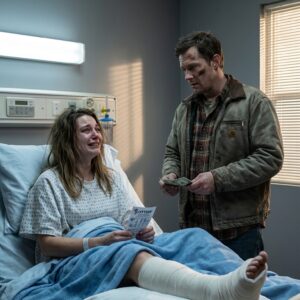My mother’s dining room has always smelled faintly of lemon oil and what I can only describe as opinion—polished wood and polished judgments. On the night I finally stood up to her, the lemon was louder than usual. Placemats aligned with military precision. Forks gleaming like accusations. I’d promised myself I would keep the peace for her sixtieth. But peace is heavy if you’re the only one holding it up.
“I don’t understand why you insist on struggling in this fashion hobby,” my mother said, navigating asparagus with a surgical knife. “You could have pursued something practical. Your sister was practical, and look at her now—senior position, beautiful home, baby on the way.” She set down her knife, even the sound controlled. “Let’s be honest, Daniela. You will never be as good as your sister.”
Twenty years’ worth of answering to a name that was not mine gathered themselves in my chest, stood up, and found my mouth.
“Then ask her to pay your bills.”
Silence arrived with a chair-scrape hush. My father’s hand froze halfway to his water glass. My sister, Sarah, went very still, the way she does when a witness says something you don’t see coming. Michael, her husband, examined his napkin like it had suddenly become a legal document. My mother blinked once, twice, like someone who had been tapped on the shoulder by a stranger who knows her first name.
“You heard me,” I said, and for the first time in my life my voice didn’t wobble in this room. “If Sarah is your measuring stick for value, then direct your expectations her way. Ask her to fund your anniversary party. Ask her to validate your choices. Ask her to fulfill whatever version of your life you wanted and didn’t get.”
I didn’t raise my voice. I didn’t have to. I had spent two decades learning to speak quietly in a house where only one kind of loudness was allowed.
To understand how I got to that sentence, you have to understand the house.
We were a framed photograph of a family on paper. My father, an engineer at a respected firm, with a pocket for pens and the patience of a man who fixes things for a living. My mother, an accountant, meticulous in ledger and life. And then there were the daughters: Sarah and me, five years between us and a canyon carved by expectation.
Sarah was the star who never burned out. Straight A’s without sweat, state piano champion before puberty, varsity tennis as if she’d been born holding a racket. Teachers grinned when they saw our last name and then scanned past me for the ghost of her excellence. “You’re Sarah’s sister?” they’d say, like I’d won a raffle and the prize was pressure. “We can’t wait to see what you do.”
I drew. That’s what I did.
At six, my world smelled like crayons and stories. I filled sketchbooks with purple skies and houses with windows the size of hope. When Sarah performed Chopin at twelve and my mother cried real tears in an auditorium that turned when she entered like the room had been waiting for her, I came home and painted us as I saw us: my mother with her book, my father with his smile, Sarah with her hands on the keys, me with the sky behind us, bright and the wrong color.
“That is nice, Daniela,” my mother said, scanning my work like it was a spreadsheet. “But why is the sky purple? Skies are blue, honey, and look—your father’s arm is too long. You should pay more attention to proportions. Sarah was drawing perfect still lifes at your age.”
I slid the painting under my bed, where many of my not-good-enoughs would go to gather dust like secrets. In between, my father would perch at the edge of my mattress and say things like, “Not everyone is meant to shine in the same way,” and, “Some stars are obvious; some are beautiful once your eyes adjust.” He said it softly, like he was sneaking contraband into my room—a belief that there was a version of me worth keeping.
By thirteen, Sarah had an early acceptance letter to a summer program in Cambridge pinned on the fridge with a lobster magnet that leered at me every time I reached for milk. Harvard banners arrived at our house like migrating birds finding an old nest. My mother planned a party with crimson napkins and a cake that read Congratulations, Sarah! in frosting neat enough to make you ashamed to cut it. I helped arrange the food. I listened to my mother tell her friends, “We always knew she was destined for greatness—from the moment she spoke in complete sentences at eighteen months. We just knew.”
I went upstairs and turned up my music and put pencil to paper so hard I tore it.
In high school I found the art room. The community center offered workshops, and I learned words like mixed media and negative space and how to make thrift-store vinyl into something you could wear with pride. I dyed a purple streak in my hair and suffered a two-week grounding for “disrespecting my appearance.” “What will people think?” my mother asked. “Sarah never went through a phase like this.”
“Maybe that’s the problem,” I said, which did not help.
I was chosen as the winner of our school’s fashion design competition sophomore year. My design—vintage bones with modern muscle, architectural and strange—was called “promising” by judges from a local art college, a word I held in my mouth like a hard candy to make it last. I burst into the kitchen with my trophy like a resuscitated thing.
“The what?” my mother said, wiping her hands on a towel. “You didn’t tell me you entered a competition. Is this why your algebra grade slipped to a C minus?”
“It’s not a hobby,” I said, and heard my voice crack. “This is what I’m good at. What I love.”
“What I see is potential being wasted,” she replied, and corrected the angle of the knives.
It’s funny, in a gallows way, what you learn to expect. I learned to anticipate the shape of her praise for my sister—full-throated and public—and the precise ratio of her praise for me—polite and private, if any. By the time I brought home an acceptance letter to State University’s design program, with a partial scholarship that made my hands tremble with relief, my mother said, “State? I suppose it’s better than community college.” The part of me that once would have bled out from such a line had callused. Maybe that’s what growing up is: your tenderness learns to wear a jacket.
College was a room with a door that finally unlocked. My dorm smelled like coffee and possibility. Zoe, my music-major roommate, practiced piano well enough to make my chest tighten with complicated love. I met Professor Linda Carter in Intro to Fashion Design and, after three classes, she held my sketches with fingertips and said, “There is a voice here. Raw, but yours.” I left class taller by an inch, as if her words had straightened years of hunching.
I joined the fashion society, made friends with people who spoke color and structure the way some people speak gossip. I dated Jason from color theory, a graphic design major with quiet eyes and hands that remembered where the coffee was without looking. For the first time, someone asked me for my opinion and then listened.
Every Sunday evening, I called home. My mother asked about my classes like she had to, and then pivoted to Sarah’s latest—youngest senior associate in her firm’s history, lead counsel on something in the paper, Michael’s family’s country club. “You should talk to your sister about how she found such a good match,” she said once. “Maybe she could introduce you to some of Michael’s colleagues.”
“I’m seeing someone,” I said, looking at Jason’s pencil smudges on our shared desk.
“Oh, the art student,” she said, as if that were a weather forecast for my life.
When my work was included in our department’s end-of-year showcase and a local blogger wrote about the way my garments looked like they could shoulder a city’s weight, Emma Wilson—that Emma Wilson, avant-garde and outspoken about sustainability—emailed me. Coffee? was the subject. The meeting turned into three hours of talking about fabrics and future and the ways fashion can be gentler on the world and still make it gasp. She offered me a spot on her team by the end of the second hour. I called my parents in the hallway of my tiny apartment, fingers slipping on my phone with excitement.
“I’ve never heard of her,” my mother said. “Is it still costume work?”
“It’s high-end fashion, Mom,” I said. “Red carpet. Vogue. This matters.”
“Well,” she sighed. “I suppose you were lucky to meet her at that theater thing.” Then, without taking a breath: “Did Sarah tell you about the antitrust case? It’s in all the papers.”
When I hung up, my father called back. “I looked her up,” he said, a smile in his voice. “She sees what I see. I’m proud of you, Dany.” The relief that came with those words could have powered a city if someone had figured out how to wire a heart.
I started at Emma’s studio and realized quickly that glamour is for people who don’t know how many stitches live inside a dress. We worked. We failed. We tried again. We ate takeout on cutting tables and argued about ethics and hem lengths with equal fervor. Six months in, I received the email that made me sit down hard on the floor: one of my pieces had been chosen for the emerging designers showcase at New York Fashion Week. I said nothing for a full minute because rage and joy apparently use the same circuit in my nervous system and I needed to make sure the joy got there first.
Then my father invited me to my mother’s sixtieth.
I went. Because you do, and because he asked in a voice that told me this meant more than cake. I brought a vintage silk scarf in her favorite colors restored by a woman who does magic with fragile things. When I walked in, Sarah hugged me, genuine. “Is that one of your designs?” she asked, studying my dress. “The structure is amazing.”
I had news. So did she. During the main course, she announced her promotion to lead counsel and her pregnancy. My mother cried the kind of tears that leave tracks, the good kind. “My first grandchild,” she said, and clapped like a little girl.
When the plates were cleared, I said, during a lull, “I have news too. My design was selected for Fashion Week.”
Sarah’s eyes lit. “That’s incredible,” she said. My father squeezed my hand. “We should all try to be there,” he said.
My mother’s smile flattened like someone had closed a piano lid. “Is that the main event,” she asked, “or some sort of sideshow?” She moved on to baby shower themes before I could answer.
By dessert, my father was discussing options for their fortieth anniversary. Venue rentals are expensive. Minimums. Corkage. Sarah offered to contribute financially. My mother beamed. Then she turned to me, eyebrows up. “And you, Daniela?”
“I can design custom invitations and decor,” I said. “It would cost a fortune if you hired someone.”
“I was thinking financial assistance,” she said, and the words as usual perched on her tongue.
That’s when she said the line that pulled the lever in my chest.
“You’ll never be as good as your sister.”
And I stood. And I said, “Then ask her to pay your bills.”
Something broke. Not me. The silence.
My father put his glass down slowly. “You pushed Sarah to excel in ways you value,” he said to my mother, his voice very calm and very tired. “And you pushed Daniela to be Sarah. Those aren’t the same thing.”
Sarah stood up and moved to my side like it was the most obvious path in the world. “She’s right, Mom,” she said. “You’ve compared us our whole lives. It’s not fair to her. It wasn’t fair to me, either. Do you know how much pressure it is to be your measuring stick?”
My mother looked genuinely bewildered, as if someone had hung a mirror in her house and she didn’t recognize herself in it. “I just want what’s best for you both,” she said, but even she didn’t sound convinced.
“I need air,” I said, and my father nodded. No one stopped me. I sat on the front steps and looked up at a sky that, if I’d been seven, I would have painted purple.
I didn’t know what would come next. I just knew the shape of my life had changed. It was bigger.
Part Two
The week after the birthday dinner, I worked like sleep was a rumor. Fashion Week approached with the velocity of a train. I cut, I stitched, I burned my fingers with steam and then pretended I meant to. At night, my brain replayed the dinner scene and then, like an editor who had finally found the good cut, rewound back to my father’s face as he said Elizabeth instead of honey and to Sarah’s voice when she said weapon and meant me.
On day six, my phone vibrated with Sarah’s name. Can we talk? Just us. We met at a cafe halfway between my apartment and her hotel. She had that lawyer calm, but when she reached across the table and put her hand on mine, her eyes were soft.
“I’m sorry,” she said. “I’m so sorry I didn’t see it. I knew she compared us, but I told myself it was normal, even motivating. That was a convenient story for me. You paid for it.”
“It wasn’t your fault,” I said, because it is possible to be a victim of a system even when you benefit from it.
We talked for three hours. She told me she had envied my certainty—how I always knew what I wanted to do, even if there wasn’t a blueprint and the map looked hand drawn. I told her I had envied how easy she made excellence look. She confessed she’d felt trapped by being “the perfect one.” I admitted I’d hidden by being “the difficult one.” We left lighter than we arrived.
Two days later, my father showed up at my studio with a sandwich and a stubborn kind of love. He looked around like a tourist in a country he’d always wanted to visit. “This is where the magic happens,” he said, and I decided not to tell him how many times it’s just math and thread and the humility to admit your first idea wasn’t good. Over food he said, “I should have protected you,” and I believed him. “Support isn’t enough when injustice is happening,” he added, and I forgave him without making a speech about it because when men like my father say I failed out loud, you hear I am trying not to anymore.
The night before my showcase, my phone buzzed. Good luck tomorrow. I know this is important to you. It was from my mother. No punctuation that could be mistaken for effusiveness. No explanation. Just a sentence that felt like someone had cracked a window on a stuffy floor and the air had learned a new way in.
Backstage at the venue, under lights that made everything look like it had been dipped in electricity, I pressed seams and kissed the back of my model’s hand for luck like a superstition I’d inherited from no one. When my piece hit the runway—transformative, literal in the way it changed shape, metaphorical in the way it asked people to reconsider what could be beautiful—there was a sound. It wasn’t the gasp I’d fantasized about. It was a murmur, sustained and hungry, the sound a room makes when it understands it is seeing something it will later call before and after.
After, in the reception swirl of industry and press and people who were important to my future but strangers to my past, I saw them. My father’s height first. Then Sarah and Michael. And next to them, my mother in a dress I’d never seen—not because it was new, but because it looked softer on her, like she’d chosen fabric instead of armor. She was wearing the scarf I restored.
“You came,” I said, and my father said what he always says when he means more than his words. “We wouldn’t miss it.”
Sarah hugged me. “The way it changed on the runway,” she whispered, delighted. Michael shook my hand like I was a new client he was genuinely excited about.
My mother stood a little apart, like a tourist who hasn’t yet decided whether she speaks the language. “It was very creative,” she said carefully, the words foreign in her mouth but the effort real. “The audience seemed quite impressed.”
“Emma Wilson spoke to us,” my father said, his glow just shy of ridiculous. “She had remarkable things to say about your talent and future prospects.”
“Is she important in your field?” my mother asked, and the question landed not like a dismissal but like someone naming a star and hoping you point to the right part of the sky.
“Very,” I said, and let the silence do its work.
We didn’t reconcile that night. Not like in movies. No swelling strings. No embrace that undoes twenty years of learning the wrong lesson. But as they turned to go, my mother touched the scarf, then reached for my hand and said, almost shy, “Dinner next week? To talk?”
“I’ll check my schedule,” I said, and meant it without malice. Boundaries are not revenge. They’re scaffolding.
The year that followed was part crescendo, part slow repair. The Fashion Week piece brought me clients and credibility. I stayed on Emma’s team until I could walk on my own without feeling like I was stealing. The first month in my tiny studio I ate ramen at a cutting table and cried twice: once from fear, once from gratitude. The second month I hired a part-time assistant. By month six I had two, and enough work to tell myself we without feeling like a fraud.
My designs found their shape on bodies and in magazines I used to whisper the names of like spells. Journalists used words I had said only to my sketchbook: architectural, transformative, sustainable. The money was not insane; it was enough. Enough is perfect when you have known not-enough intimately.
Sarah and I discovered a sisterhood that did not require one of us to perform a caricature to balance the other’s story. I designed Lily’s christening gown, hand-stitched with pieces of our grandmother’s old lace that my father found in a box in the attic, yellowed by time and folded around a letter no one living had written. Sarah cried. I did too. We blamed hormones. It was more than that.
My mother and I learned a choreography that was new for both of us. She still slipped sometimes. “Sarah updated the kitchen,” she said once. “Quartz countertops. Maybe one day you’ll—” and then stopped herself, a new muscle remembering it has power. Other times she got it right on the first try. “Explain selvedge again?” she asked over dinner, and pulled out a notepad like my professor. She framed one of my sketches and hung it next to Sarah’s law school diploma. The wall looked like a truce.
At the opening of my first solo exhibition—a small gallery, white walls like a held breath—my family came. My father moved through the crowd, saying, “I’m Daniela’s dad,” to anyone who would listen. Sarah worked the room like a pro, introducing me to people she thought could help in ways that didn’t feel like help but like connection. My mother stood in front of a jacket from my Reclamation series—a piece made from garments that had lived other lives—and lifted the sleeve between her fingers.
“It’s beautiful,” she said when I joined her. “I don’t understand all the technical parts, but I can see—it’s special. The way you’ve honored the original and made something new.” Her voice wobbled. “It’s…remarkable, what you do.”
“I have something for you,” I said, and led her to a corner where a dress waited on a mannequin. I had designed it from a photo of her in her twenties that my father had shown me: a version of my mother before children, before comparison, before fear taught her a narrow definition of love. It was classic in shape, my language in the seams.
“You made this—” she began, and then stopped because crying in public is a thing she has always hated, and because a woman who has spent her life measuring worth in numbers was realizing what cannot be added up.
“For you,” I said.
She touched the fabric like it was skin. “I’m proud of you,” she said, and the words did not come out like a concession or a trick. They came out like a truth she had finally practiced enough to say out loud. “For who you are. Not for who I thought you should be.”
I did not collapse into her arms like a child. That is not how this works. I nodded. “Thank you,” I said, and felt something unhook inside my chest, a clasp that had kept my heart wearing a weight it no longer needed.
When the night ended, I stood alone in the gallery for a moment, the echo of voices folding into wall and fabric. My pieces stood still and impossible and exactly right. I traced my fingers over a seam without touching it and thought about the girl who once slid her purple-sky painting under a bed because a sky wasn’t allowed to be anything but blue.
We had not rewritten the past. That is not a thing anyone can do. But I had written my own ending for that chapter, and it did not end with me apologizing for taking up space.
A few weeks later, my mother called about the anniversary party. “We’re thinking the Gardenia Room,” she said. “It’s expensive.”
“Ask Sarah,” I almost joked, but the laugh caught in my throat and turned into something better. “I’ll design the invitations,” I said. “And the room. It’ll be the most beautiful version of you and Dad—forty years in wood and fabric and light.”
She took a breath. “We’ll split it,” she said. “Your father and I will pay for the venue. You make it beautiful. Sarah will handle the…what do you call it…logistics.” She laughed at herself. “And Daniela? Send me sketches. I want to see.”
On the day of the party, my mother wore the dress I’d made her. The Gardenia Room did what rooms do when someone who loves you insists on arranging them as if you deserve to be celebrated: it held everyone gently while they told you you matter. My father cried when the lights dimmed and old photos played on a screen—two kids, thinner and more certain than they had any right to be, then two women, one learning not to be flawless and the other learning not to be afraid.
At some point in the evening, Sarah squeezed my hand. “Different paths,” she said. “Same family.”
“Success in different dialects,” I said, and she smiled.
When people ask me now—students, nieces, strangers on the internet—how you find the courage to stand up when your whole life has told you to sit down, I tell them the truth: you don’t. You stand up terrified. You stand up after practice in your room, under your breath, into a wall. You stand up not because you are sure, but because you are finally more tired of being quiet than you are afraid of their reaction. You stand up once and then again. You build a life around that voice until it is your house and they are the guests with a thirty-day limit.
My mother will never be a woman who says I was wrong like it costs nothing. She will always prefer numbers to nuance. But when Lily toddled into my studio last week and smeared peanut butter on a muslin drape, my mother gasped, then looked at me, and when she saw me smiling, she smiled too. “It’ll wash,” she said, and I thought, Some things do. Some don’t. The point is knowing which.
The sky outside my apartment window was purple last night. I didn’t have to justify it to anyone. I just stood there and watched, and then I sketched the way the light folded itself into evening and let the page be the wrong color and exactly right.





